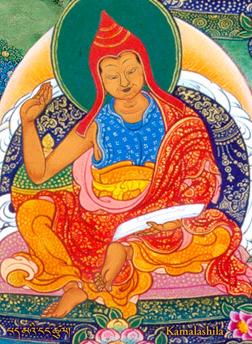Vipashyana: Difference between revisions
Jump to navigation
Jump to search
| Line 23: | Line 23: | ||
*[[Dzigar Kongtrul Rinpoche]], Rigpa Amsterdam, 23-25 May 1997 | *[[Dzigar Kongtrul Rinpoche]], Rigpa Amsterdam, 23-25 May 1997 | ||
*[[Mingyur Rinpoche]], [[Lerab Ling]], 1-3 August 2002 | *[[Mingyur Rinpoche]], [[Lerab Ling]], 1-3 August 2002 | ||
*Mingyur Rinpoche, Lerab ling, 18-19 July 2003 | |||
*[[Tsoknyi Rinpoche]], Lerab Ling, 11 & 13 August 2003 | *[[Tsoknyi Rinpoche]], Lerab Ling, 11 & 13 August 2003 | ||
*[[Dzongsar Khyentse Rinpoche]], Rigpa Paris, 3-4 April 2004 | *[[Dzongsar Khyentse Rinpoche]], Rigpa Paris, 3-4 April 2004 | ||
===Edited Teachings of Sogyal Rinpoche=== | ===Edited Teachings of Sogyal Rinpoche=== | ||
Revision as of 10:26, 14 December 2018

Vipashyana (Skt. vipaśyanā; Tib. ལྷག་མཐོང་, lhaktong, Wyl. lhag mthong) — 'clear seeing' or 'insight' meditation.
Etymology
- Vi is short for vishesa, which means ‘special’, ‘superior’, or ‘particular’.
- Pashyana , means ‘to see’ or ‘to look’.
- Lhak is ‘unique’ and
- tong is ‘seeing’.
So, it means ‘to look at things in a very direct and especially clear way’.
Prerequisites for Vipashyana
Kamalashila’s second Stages of Meditation (Skt. Bhāvanākrama) mentions three prerequisites for developing vipashyana:
- Reliance upon a spiritual teacher
- Genuinely engaging in extensive study
- Appropriate reflection
Alternative Translations
- intense insight (Dharma Publishing)
Teachings Given to the Rigpa Sangha
- Dzigar Kongtrul Rinpoche, Rigpa Amsterdam, 23-25 May 1997
- Mingyur Rinpoche, Lerab Ling, 1-3 August 2002
- Mingyur Rinpoche, Lerab ling, 18-19 July 2003
- Tsoknyi Rinpoche, Lerab Ling, 11 & 13 August 2003
- Dzongsar Khyentse Rinpoche, Rigpa Paris, 3-4 April 2004
Edited Teachings of Sogyal Rinpoche
- Vipashyana—Preliminary Practices, Dzogchenlink January 2004
Further Reading
- View: The Rigpa Journal, July 2010, 'Shamatha and Vipashyana', a teaching by Kyabjé Dilgo Khyentse Rinpoche, pages 18-22.